Get Involved

 Become a Thought Partner
Become a Thought Partner
Partner with us to produce thought leadership that moves the needle on behavioral healthcare.
 Other options to get involved
Other options to get involved

Thank you!
We received your information and will be in contact soon!
Get Involved

 Grantmaking
Grantmaking
We fund organizations and projects which disrupt our current behavioral health space and create impact at the individual, organizational, and societal levels.
 Participatory Funds
Participatory Funds
Our participatory funds alter traditional grantmaking by shifting power
to impacted communities to direct resources and make funding decisions.
 Special Grant Programs
Special Grant Programs
We build public and private partnerships to administer grant dollars toward targeted programs.
 Program Related Investments
Program Related Investments
We provide funds at below-market interest rates that can be particularly useful to start, grow, or sustain a program, or when results cannot be achieved with grant dollars alone.
Get Involved

 Tia Burroughs Clayton, MSS
Tia Burroughs Clayton, MSS
Learning and Community Impact Consultant
Add some text here
 Alyson Ferguson, MPH
Alyson Ferguson, MPH
Chief Operating Officer
Contact Alyson about grantmaking, program related investments, and the paper series.
 Samantha Matlin, PhD
Samantha Matlin, PhD
Senior Learning & Community Impact Consultant
Contact Samantha about program planning and evaluation consulting services.
 Caitlin O'Brien, MPH
Caitlin O'Brien, MPH
Director of Learning & Community Impact
Contact Caitlin about the Community Fund for Immigrant Wellness, the Annual Innovation Award, and trauma-informed programming.
 Joe Pyle, MA
Joe Pyle, MA
President
Contact Joe about partnership opportunities, thought leadership, and the Foundation’s property.
 Bridget Talone, MFA
Bridget Talone, MFA
Grants Manager for Learning and Community Impact
Add some text here
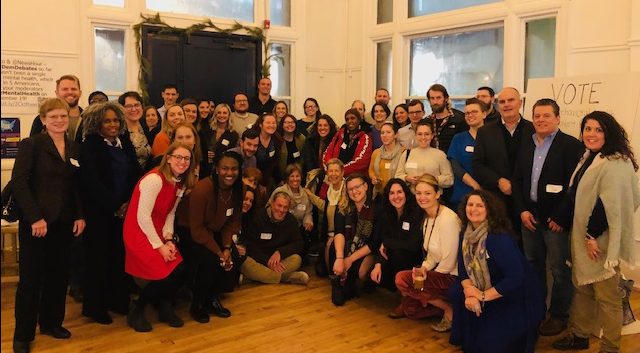
This is a good story about mental health.
Let’s say a bunch of social workers, nurses, trauma specialists, philanthropists, non-profit professionals, writers, EMTs, and data crunchers walk into a bar.
Knock knock, no joke, this actually happened in December 2019.
Mental health professionals begin to schmooze over spinach mushroom rolls, cheese and hummus platters, and ginger brew.
Sounds good right. There’s so many reasons to luv Philly.
The event was sponsored by the Scattergood Foundation whose mission is to establish new paradigms for behavioral health that value the unique spark and basic dignity in every human. Scattergoo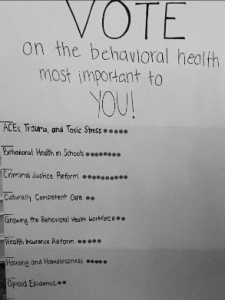 d allocates funds to agencies with similarly aligned missions in mental health across Philadelphia. Through its Innovation Fund alone, Scattergood awards $25,000.00 for cutting edge ideas advancing mental health care and policy.
d allocates funds to agencies with similarly aligned missions in mental health across Philadelphia. Through its Innovation Fund alone, Scattergood awards $25,000.00 for cutting edge ideas advancing mental health care and policy.
Amidst the veggie platters and cheese cubes at the Triple Bottom Brewery, there were big notepads with red stickers to vote for the behavioral health issue most important to us. The choices were “ACES trauma and toxic stress, behavioral health in schools, criminal justice reform, culturally competent care, growing the behavioral health workforce, health insurance reform, housing and homelessness, opioid epidemic, suicide, and other.”
As an aside, I briefly wondered where guns were, and then regained perspective that guns are not a mental health issue but lobbyists spin the story onto mental health so we do not see guns as the problem. This is how alt narratives work. Gun violence in America invades bodies and minds everywhere without obtaining permission anywhere and then appoints blame elsewhere. This is how #MeToo works–acting without consent and failing to take responsibility which is distinctly different from how metal illness works. Managing mental health is often about individuals and families desperately seeking resources to balance a bio-chemical brain imbalance.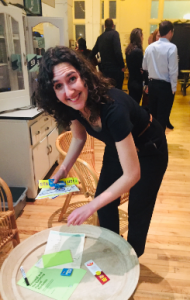
After voting for the behavioral health most important to us with our little red stickers, it was time to work the room. This was the fun part. The networking conversations proved fascinating; people were knowledgeable about mental health and had impressive credentials. We could speak openly about our work which was usually confidential. In a circle of middle age women, white and black, with nose piercings and PhDs, we discussed publications and radio shows designed to empower at-risk youth and adults.
I spoke with a nurse wrestling with her profession. She was surprised to find that many front line hospital staff do not care about patients as she did. For nearly a decade, she experienced distress with colleagues who did not care about anti-racism and anti-sexism values in the care and mainly wanted a paycheck and benefits from a prominent hospital. She worried about the future of care for patients, staff, doctors, insurance companies, and more. “We are going to have to talk with each other more, let go of ego, and learn how to work together better across teams.”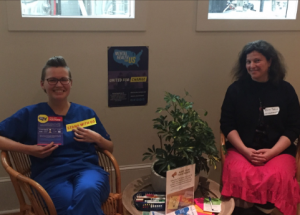
I asked what kind of trauma trainings nurses receive today in Philadelphia. “Trauma is mainly talked about in the ER but not really in other hospital departments” she said, and it is concerning because trauma survivors benefit from trauma-informed care beyond the ER as well. She voiced concerns about the online nursing programs where nursing students “never have to sit in an actual room with people who look different and think different than them. This leads to a lack in cultural competency and not really knowing how to treat people who are different than you. We’re in a nursing shortage and need bodies but we’re not paying enough attention to the bodies we’re caring for and social determinants of health,” she said. A group of 20 something’s had developed an app to try to improve mental health by linking it with primary care. This is a snapshot of Mental Health Happy Hour on a cold December night. We need to share these stories to transform the stigma of mental health, to highlight the good, and to let thousands of families wrestling with mental health issues know they are not alone.
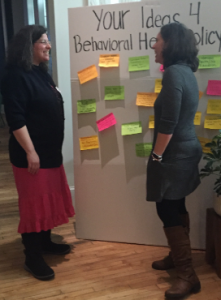 Growing up, I was taught that the most important thing in life is your health, including body, mind, spirit, neighborhoods, and schools. As a social worker, I notice how communication, curiosity, compassion, funding, and the capacity to leverage diverse view points represent key ingredients to improving the health of individuals, families, and society.
Growing up, I was taught that the most important thing in life is your health, including body, mind, spirit, neighborhoods, and schools. As a social worker, I notice how communication, curiosity, compassion, funding, and the capacity to leverage diverse view points represent key ingredients to improving the health of individuals, families, and society.
On my way home, I felt like the good in the world outweighed the bad, like the people who care about humanity outnumbered those who do not. Relief. Many businesses have an annual holiday party but not so much in the behavioral health field. I was struck by how smart, creative people who have the resources are indeed utilizing the resources to effectively bring people together in the field and advance the quality of behavioral health services. The Scattergood Foundation is to be applauded for helping people to think, do, and act to form healthier societies.
Aviva Perlo is the Director of Creative Coping. She has worked with the Scattergood Foundation as a member of the Philadelphia ACE Task Force.
All contents copyright. Aviva Perlo © 2019.
www.creativecoping.us/contact













